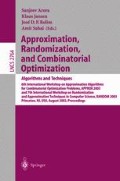Abstract
This paper addresses the question: what processes take polynomial time on a quantum computer that require exponential time classically? We show that the hitting time of the discrete time quantum random walk on the n-bit hypercube from one corner to its opposite is polynomial in n. This gives the first exponential quantum-classical gap in the hitting time of discrete quantum walks. We provide the basic framework for quantum hitting time and give two alternative definitions to set the ground for its study on general graphs. We outline a possible application to sequential packet routing.
Access this chapter
Tax calculation will be finalised at checkout
Purchases are for personal use only
Preview
Unable to display preview. Download preview PDF.
References
Aharonov, D., Ambainis, A., Kempe, J., Vazirani, U.: Quantum walks on graphs. In: Proc. 33th STOC, pp. 50–59. ACM Press, New York (2001)
Ambainis, A., Bach, E., Nayak, A., Vishwanath, A., Watrous, J.: One-dimensional quantum walks. In: Proc. 33th STOC, pp. 60–69. ACM, New York (2001)
Aldous, D., Fill, J.: Reversible markov chains and random walks on graphs, Unpublished, preprint available at http://statwww.berkeley.edu/users/aldous/RWG/book.html (2001)
Bennett, C.H., Bernstein, E., Brassard, G., Vazirani, U.: Strengths and weaknesses of quantum computing. Siam Journal on Computing 26(1510) (1997)
Childs, A.M., Cleve, R., Deotto, E., Farhi, E., Gutmann, S., Spielman, D.A.: Exponential algorithmic speedup by quantum walk. In: Proc. 35th STOC (2003) (to appear)
Childs, A., Farhi, E., Gutmann, S.: An example of the difference between quantum and classical random walks. Quantum Information Processing 1(35) (2002)
Dyer, M., Frieze, A., Kannan, R.: A random polynomial-time algorithm for approximating the volume of convex bodies. Journal of the ACM 38(1), 1–17 (1991)
Farhi, E., Gutmann, S.: Quantum computation and decision trees. Phys. Rev. A. 58, 915–928 (1998)
Grover, L.: A fast quantum mechanical algorithm for database search. In: Proc. 28th STOC, Philadelphia, Pennsylvania, pp. 212–219. ACM, New York (1996)
Bennett, C.H., Bernstein, E., Brassard, G., Vazirani, U.: Strengths and weaknesses of quantum computing. Siam Journal on Computing 26(1510) (1997)
Hallgren, S., Russell, A., Ta-Shma, A.: Normal subgroup reconstruction and quantum computation using group representations. In: Proc. 32nd STOC, pp. 627–635 (2000)
Jerrum, M., Sinclair, A.: Approximate counting, uniform generation and rapidly mixing Markov chains. Information and Computation 82(1), 93–133 (1989)
Meyer, D.: From quantum cellular automata to quantum lattice gases. J. Stat. Phys. 85, 551–574 (1996)
Motwani, R., Raghavan, P.: Randomized Algorithms. Cambridge University Press, Cambridge (1995)
Moore, C., Russell, A.: Quantum walks on the hypercube. In: Rolim, J.D.P., Vadhan, S.P. (eds.) RANDOM 2002. LNCS, vol. 2483, pp. 164–178. Springer, Heidelberg (2002)
Nielsen, M.A., Chuang, I.L.: Quantum Computation and Quantum Information. Cambridge University Press, Cambridge (2000)
Papadimitriou, C.: RANDOM 2002. Addison Wesley, Reading (1994)
Schöning, U.: A probabilistic algorithm for k-SAT and constraint satisfaction problems. In: Proc. 40th FOCS, pp. 410–414. IEEE, Los Alamitos (1999)
Shor, P.W.: Polynomial-time algorithms for prime factorization and discrete logarithms on a quantum computer. SIAM J. Comp. 26(5), 1484–1509 (1997)
Simon, D.: On the power of quantum computation. SIAM J. Comp. 26(5), 1474–1483 (1997)
Shenvi, N., Kempe, J., Whaley, K.B.: A quantum random walk search algorithm. Phys. Rev. A 67(5), 52307 (2003)
Watrous, J.: Quantum simulations of classical random walks and undirected graph connectivity. Journal of Computer and System Sciences 62(2), 376–391 (2001)
Yamasaki, T.: personal communication (2001)
Yamasaki, T., Kobayashi, H., Imai, H.: An analysis of absorbing times of quantum walks. In: Calude, C.S., Dinneen, M.J., Peper, F. (eds.) UMC 2002. LNCS, vol. 2509, pp. 315–330. Springer, Heidelberg (2002)
Author information
Authors and Affiliations
Editor information
Editors and Affiliations
Rights and permissions
Copyright information
© 2003 Springer-Verlag Berlin Heidelberg
About this paper
Cite this paper
Kempe, J. (2003). Discrete Quantum Walks Hit Exponentially Faster. In: Arora, S., Jansen, K., Rolim, J.D.P., Sahai, A. (eds) Approximation, Randomization, and Combinatorial Optimization.. Algorithms and Techniques. RANDOM APPROX 2003 2003. Lecture Notes in Computer Science, vol 2764. Springer, Berlin, Heidelberg. https://doi.org/10.1007/978-3-540-45198-3_30
Download citation
DOI: https://doi.org/10.1007/978-3-540-45198-3_30
Publisher Name: Springer, Berlin, Heidelberg
Print ISBN: 978-3-540-40770-6
Online ISBN: 978-3-540-45198-3
eBook Packages: Springer Book Archive

